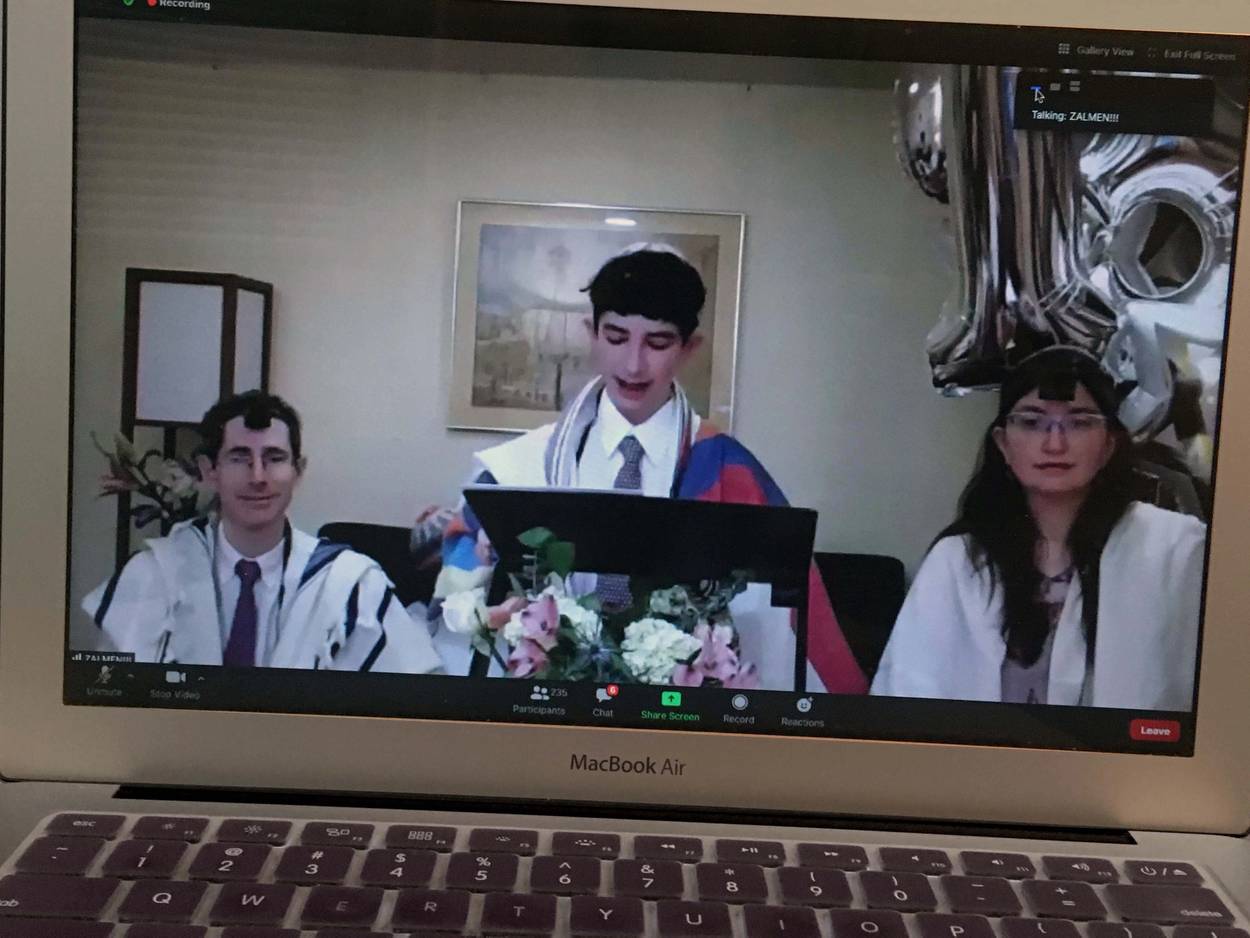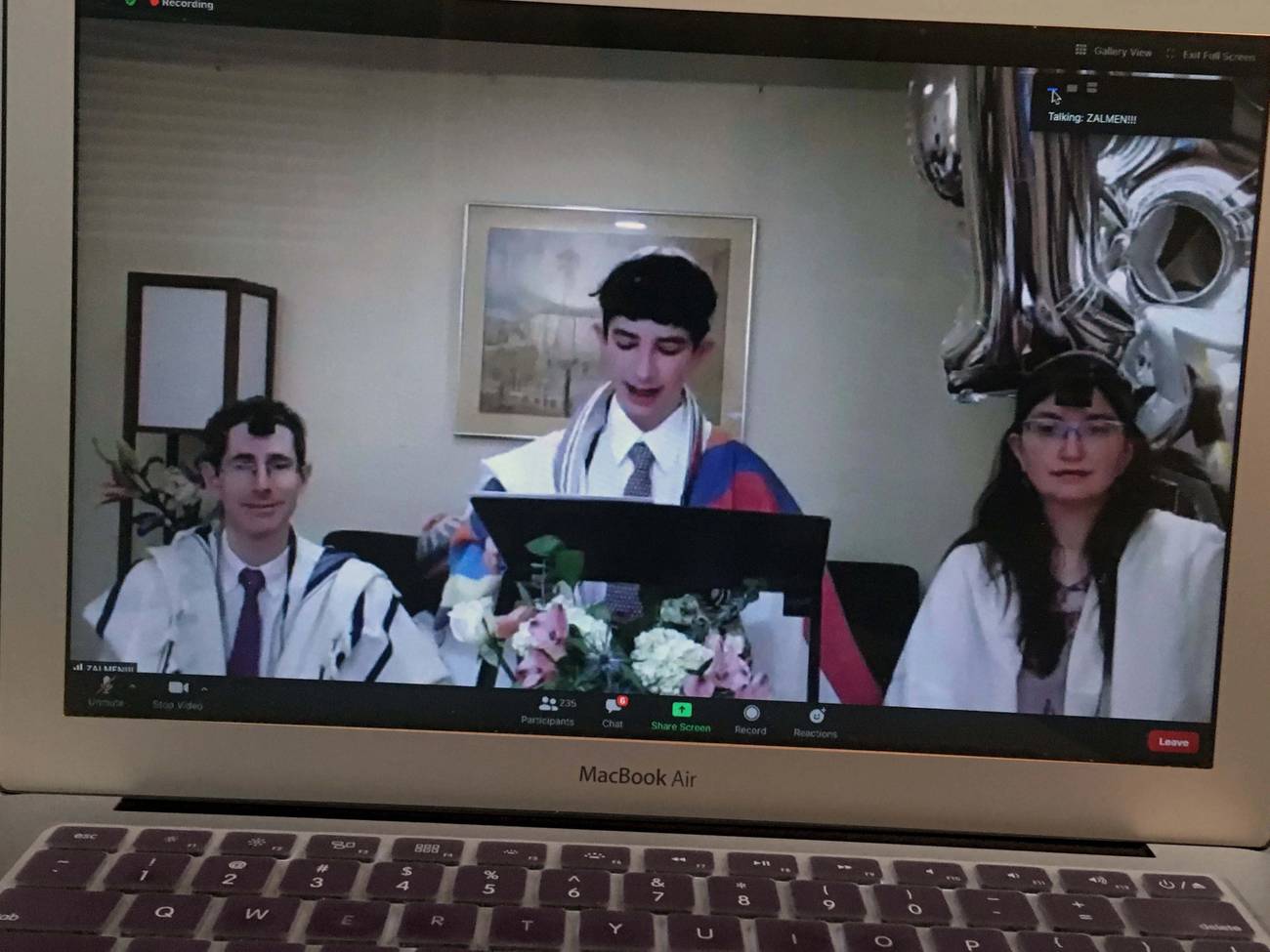Zoom Mitzvahs
As parents plan bar and bat mitzvahs during the pandemic, a rite of passage is reimagined with new priorities to fit a new reality




In the days leading up to her son Jacob’s bar mitzvah on March 14, Jennifer Friedman watched plans quickly unravel. As Michigan became a COVID-19 hot spot and social distancing restrictions tightened, out-of-town relatives began canceling, and the party was postponed. Finally, the day before the bar mitzvah, the family’s Conservative synagogue, Congregation Shaarey Zedek in Southfield, Michigan, limited attendance in the 1,100-seat sanctuary to the immediate family, for health and safety reasons.
Nevertheless, the bar mitzvah turned out to be a meaningful experience. Friedman is grateful that, despite the circumstances, Jacob was still able to receive an aliyah and chant Torah and haftarah, and that their extended family, friends, and community could attend the Shabbat service via livestream. After services, a small group danced a socially distanced hora in the family’s backyard. “My biggest takeaways are that we were able to keep our child grateful for what he did have and not sad about what he lost, and that we still were able to have family around and celebrate without a big party,” said Friedman.
Like other aspects of American Jewish institutional life affected by the coronavirus, bar and bat mitzvahs have been disrupted and must now adapt to a new reality. With synagogues shuttered, in-person gatherings strictly limited, and b’nai mitzvah trips to Israel canceled, families have needed to quickly shift gears by postponing their plans or holding virtual bar and bat mitzvahs via Zoom or livestream. In some cases, there are also financial losses because they have already mailed invitations, purchased customized party favors and other nonrefundable items, or signed nonnegotiable contracts with party vendors.
The Friedmans’ rabbi, Aaron Starr, views the pandemic as a wakeup call about the fragility of life and what truly matters. “People are remembering that the service is the most important part of a child’s transition to young adulthood. When we recite the Shehecheyanu, they are extremely powerful words in the midst of a pandemic,” said Starr, whose own son celebrated his Zoom bar mitzvah in May with only immediate family present at the Shabbat morning service in the Shaarey Zedek sanctuary—rather than an entire Memorial Day weekend celebration with hundreds of friends, relatives, and community members. “My son, Caleb, said that what was most important was that his grandparents and 100-year-old, Holocaust survivor great-grandfather could be with him. In the bar and bat mitzvahs I have seen both as a father and rabbi, I have seen more joy shed than ever before.”
With the global pandemic has come a reimagining of the bar/bat mitzvah. Over the past few months, many simchas that were originally intended to be traditional in-person celebrations have been changed or reimagined, often at the last minute, to accommodate the restrictions (on gatherings, on travel, on businesses) that COVID-19 has wrought. But parents who first started making plans after the pandemic began face a different dilemma: The pandemic has continued to spread, and while some restrictions have been lifted, others have been put back in place, and nobody can reliably predict what the situation will look like several months from now; at the same time, bar and bat mitzvah dates are often set far in advance, and changing that date isn’t always a viable option—not just because of caterers and airline tickets, but because of Torah and haftarah portions that are already being learned.
So, faced with set dates but uncertain about what the situation will look like down the road, parents have started planning bar and bat mitzvahs as virtual events—deliberately, right from the outset. The Zoom mitzvah isn’t just an emergency contingency plan anymore; it has become the real deal.
Virtual mitzvah planning requires a significant change in mindset, as well as flexibility and creativity in adapting to still relatively uncharted territory. For Zalmen Richmond-Shazeer, that meant changing expectations from a Labor Day weekend bar mitzvah celebration with friends, family, and community to Zoom weekday services on his Hebrew birthday, the 17th of Tammuz, a Jewish fast day. Scheduling a Zoom service on a Thursday morning also meant that guests who refrain from using technology on Shabbat could be present.
“Once we decided it would be the real thing, it made everything else fall into place,” said Zalmen’s mother, Shira Shazeer, school rabbi at the MetroWest Jewish Day School in Framingham, Massachusetts. “The greatest challenge was coming around to the idea that this was a moment that would be significant and we would have our family and friends together.”
Achieving these goals required rapid-fire preparation because there were only six weeks between finalizing this decision and the new bar mitzvah date. There were new Torah portions, haftarah, and a d’var Torah (interpretation of the Torah text) to prepare; melodies to practice for the weekday morning, afternoon, and evening services; and a Kabbalat Shabbat service to learn. Zalmen also wanted to make more progress on his mitzvah project, a series of original concerts for senior living communities in the Boston area.
“Once you decide on a Zoom mitzvah, it’s important to throw yourself into it as much as you can,” said Ken Richmond, cantor at Temple Israel of Natick, Massachusetts, who prepared his son in record speed, with daily bar mitzvah lessons while Zalmen’s mother helped him prepare his d’var Torah.
Zalmen’s Zoomin’ Bar Mitzvah was a weeklong extravaganza, from the weeks leading up to and immediately following the bar mitzvah services including more than a half-dozen intimate themed gatherings with family and close friends (with suggested menus, ranging from pizza to barbecue, sent in advance), an ice cream party for grandparents and close relatives, a Friday night dinner, Sunday brunch, as well as fun trivia and party game nights with Zalmen’s friends—all taking place over Zoom.
At 9:30 a.m. on July 9, approximately 300 computer screens from across North America and Israel Zoomed into the bar mitzvah held in the family’s basement. Zalmen, wearing his new tallit, led the shacharit (morning) service, with a flower-decorated reading lectern serving as the makeshift bimah. After Zalmen chanted from the Torah, hundreds of unmuted voices shouted “mazel tov,” throwing candy and raisins at the computer screen and writing well wishes in the Zoom chat. Afterward, guests stayed to schmooze and watch Zalmen’s “Vid Hug,” a collection of video greetings from friends and relatives.
Later that day, Zalmen led the mincha (afternoon) service, also chanting Torah and haftarah. Afterward, face-masked friends and relatives attended a “Drive-by Bar Mitzvah” party, waving and shouting “mazel tov” from their cars to the bar mitzvah family gathered on their front lawn.
Importantly, a Zoom mitzvah requires both reimagining the bar/bat mitzvah experience and fastidious attention to a slew of details, from technical setup to party planning. That’s why Erica Silverman decided to create a Facebook group the day after her son’s May 9 bar mitzvah, which was Zoomed from home during Shabbat services at Temple Shir Tikva, a Reform synagogue in Wayland, Massachusetts. “We had an unexpected experience with Gabe’s bar mitzvah, nothing we planned and more than we could ever imagine,” said Silverman. “My son decided that the Zoom mitzvah was so fulfilling that I canceled the party at a local country club, and no one in my family was disappointed.”
”Virtual Mitzvah Planning” provides a support system for over 1,200 members from the U.S., England, and South Africa who discuss everything from disrupted plans to Zoom party planners and videographers, invitations, party swag (with personalized masks and hand sanitizers popular items), lawn signs, and the logistics of microparties, i.e., socially distanced, small, outdoor gatherings.
Nevertheless, it’s still normal to mourn disrupted plans. Rabbi Paul Kipnes of Congregation Or Ami, a Reform synagogue in Calabasas, California, works with families to overcome disappointment, advising parents to teach their children that becoming an adult also means learning from this experience and recognizing that some things cannot be controlled.
“When I bless these children, I talk about the courage to hold onto their Jewish tradition during a pandemic,” said Kipnes. Because of the uncertainty ahead, he recommends holding virtual ceremonies immediately rather than postponing. He also suggests dividing the bar/bat mitzvah into three parts: ceremony, community, and celebration. The ceremony takes place now; the community affirmation where grandparents and parents pass down the Torah to the child, m’dor l’dor, from generation to generation, will occur when in-person sanctuary services resume; and a celebration or party at a future date—although many families are opting to eliminate the party.
“I am seeing greater strength, determination, and, for the first time in my 28 years as a rabbi, I am seeing a consistent focus on ceremony rather the party,” said Kipnes. “People are focusing on what’s really important, which is the transition of the child taking his first steps to adulthood … We are finding that with compassionate adult leadership, the bar/bat mitzvah experience is teaching children to push forward … and I think that parts of this generation will emerge, not horrified by the time of COVID shelter, but strengthened.”
Because non-Orthodox movements are now acknowledging communal prayer over a virtual screen because it is a sha’at hadehak, time of unusual and pressing circumstances, virtual bar/bat mitzvah ceremonies are now commonplace. But it’s more challenging in the Orthodox community, where a virtual minyan is not acceptable because individuals are not physically present in one room. So while Orthodox congregations do not convene virtual minyanim with formal prayer, some communities are conducting short celebrations over Zoom as an affirmation that the child has reached bar/bat mitzvah age. Sometimes the parents will also bless the child.
“Whenever we have a young man or woman reaching the age of majority, we want them to affirm their relationship to Torah study, to tefila (especially communal prayer), and a life of responsibility, hesed or lovingkindness, and social justice,” explained Rabbi Benjamin Samuels of Shaarei Tefillah, a modern Orthodox congregation in Newton, Massachusetts. The emphasis is on lifelong learning, with children showcasing their learning over Zoom by delivering a d’var Torah or chanting Torah.
As for the future of the virtual b’nai mitzvah trend, that remains a matter of scholarly debate. Jack Wertheimer, who teaches American Jewish history at the Jewish Theological Seminary, is skeptical about the future of Zoom as a replacement for synagogue community. Jonathan Sarna, professor of American Jewish history at Brandeis University, expects to see the normalization of lifecycle events also broadcast on Zoom for many years ahead, especially for those unable to attend, such as elderly grandparents.
Whether the global pandemic permanently alters and reshapes the bar/bat mitzvah remains to be seen. In any case, it’s a coming-of-age celebration that has evolved over the centuries from the simple rabbinic precept that, at age 13, the child is ready to fulfill the mitzvot, or commandments, (Mishna Avot 5: 21) up to mid-20th- and early-21st-century elaborate affairs for both young men and women as well as ceremonies for adults.
Looking ahead to the coming year, it’s now a matter of rolling with the punches during these uncertain times. “We are looking forward to celebrating in the sanctuary with clergy, family, and the number of guests permitted that day, following state guidelines,” said Bonnie Handel, whose son’s bar mitzvah is scheduled for Jan. 9, 2021, at Har Shalom, a Conservative congregation in Potomac, Maryland. “For me, the positive is that Matthew is only focusing on his service, which is really the only important aspect of the bar mitzvah.”
Paula Jacobs is a writer in the Boston area.